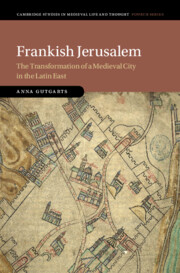Book contents
- Frankish Jerusalem
- Cambridge Studies in Medieval Life and Thought
- Frankish Jerusalem
- Copyright page
- Dedication
- Contents
- Figures, Maps and Tables
- Note on Names, Toponyms and References to Documents
- Acknowledgements
- Abbreviations
- Introduction
- Chapter 1 The Transformation of Frankish Jerusalem
- Chapter 2 The Earthly City
- Chapter 3 Jerusalem and Its Hinterland
- Chapter 4 From Depopulated and Dilapidated Town into A Capital
- Chapter 5 Continuity and Change in the Social Structures of Jerusalem in the Second Half of the Twelfth Century
- Conclusion
- Appendix Places Mentioned in the Text
- Bibliography
- Index
Conclusion
Published online by Cambridge University Press: 15 February 2024
- Frankish Jerusalem
- Cambridge Studies in Medieval Life and Thought
- Frankish Jerusalem
- Copyright page
- Dedication
- Contents
- Figures, Maps and Tables
- Note on Names, Toponyms and References to Documents
- Acknowledgements
- Abbreviations
- Introduction
- Chapter 1 The Transformation of Frankish Jerusalem
- Chapter 2 The Earthly City
- Chapter 3 Jerusalem and Its Hinterland
- Chapter 4 From Depopulated and Dilapidated Town into A Capital
- Chapter 5 Continuity and Change in the Social Structures of Jerusalem in the Second Half of the Twelfth Century
- Conclusion
- Appendix Places Mentioned in the Text
- Bibliography
- Index
Summary
This chapter presents an overview of the main arguments raised in the previous chapters and highlights the paradigm shift this book offers in our perception of the urban transformation of Frankish Jerusalem in regard to four main points: (1) the tendency to examine Jerusalem’s transformation mainly in regard to monumental religious shrines; (2) the perception that the urban fabric and municipal mechanisms remained the same throughout the twelfth century; (3) the tendency to differentiate between socio-economic and institutional processes, the evolution of symbolic landscape and the development of the cityscape; and (4) the notion that Jerusalem’s exceptional historical circumstances hinder comparative analysis. Instead, this book offers an integrative approach, which presents the cityscape as a work in progress, shaped by converging institutional, social and economic interests and motivations that were themselves affected by the shifting conditions in the Latin East in the twelfth century.
Keywords
- Type
- Chapter
- Information
- Frankish JerusalemThe Transformation of a Medieval City in the Latin East, pp. 235 - 247Publisher: Cambridge University PressPrint publication year: 2024

